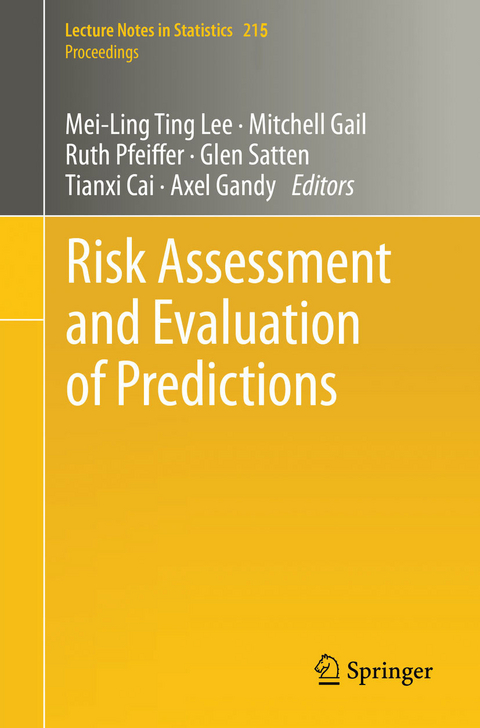
Risk Assessment and Evaluation of Predictions
Seiten
2013
Springer-Verlag New York Inc.
978-1-4614-8980-1 (ISBN)
Springer-Verlag New York Inc.
978-1-4614-8980-1 (ISBN)
Methods of risk analysis and the outcome of particular evaluations and predictions are covered in detail in this proceedings volume, whose contributions are based on invited presentations from Professor Mei-Ling Ting Lee's 2011 symposium on Risk Analysis and the Evaluation of Predictions.
Methods of risk analysis and the outcome of particular evaluations and predictions are covered in detail in this proceedings volume, whose contributions are based on invited presentations from Professor Mei-Ling Ting Lee's 2011 symposium on Risk Analysis and the Evaluation of Predictions. This symposium was held at the University of Maryland in October of 2011. Risk analysis is the science of evaluating health, environmental, and engineering risks resulting from past, current, or anticipated, future activities. The use of these evaluations include to provide information for determining regulatory actions to limit risk, present scientific evidence in legal settings, evaluate products and potential liabilities within private organizations, resolve World Trade disputes amongst nations, and educate the public concerning particular risk issues. Risk analysis is an interdisciplinary science that relies on epidemiology and laboratory studies, collection of exposure and other field data, computer modeling, and related social, economic and communication considerations. In addition, social dimensions of risk are addressed by social scientists.
Methods of risk analysis and the outcome of particular evaluations and predictions are covered in detail in this proceedings volume, whose contributions are based on invited presentations from Professor Mei-Ling Ting Lee's 2011 symposium on Risk Analysis and the Evaluation of Predictions. This symposium was held at the University of Maryland in October of 2011. Risk analysis is the science of evaluating health, environmental, and engineering risks resulting from past, current, or anticipated, future activities. The use of these evaluations include to provide information for determining regulatory actions to limit risk, present scientific evidence in legal settings, evaluate products and potential liabilities within private organizations, resolve World Trade disputes amongst nations, and educate the public concerning particular risk issues. Risk analysis is an interdisciplinary science that relies on epidemiology and laboratory studies, collection of exposure and other field data, computer modeling, and related social, economic and communication considerations. In addition, social dimensions of risk are addressed by social scientists.
Mei-Ling-Ting Lee, Ph.D. Professor and Chairman Department of Statistics University of Maryland College Park, Maryland.
Preface.- Methods for Evaluating Prediction Performance of Biomarkers and Tests.- Multiple Imputation Approach for Surrogate Marker Evaluation in the Principal Strati cation Causal Inference Framework.
| Reihe/Serie | Lecture Notes in Statistics ; 215 | Lecture Notes in Statistics - Proceedings |
|---|---|
| Zusatzinfo | XI, 445 p. |
| Verlagsort | New York, NY |
| Sprache | englisch |
| Maße | 155 x 235 mm |
| Themenwelt | Mathematik / Informatik ► Mathematik ► Computerprogramme / Computeralgebra |
| Mathematik / Informatik ► Mathematik ► Wahrscheinlichkeit / Kombinatorik | |
| Studium ► Querschnittsbereiche ► Epidemiologie / Med. Biometrie | |
| Schlagworte | Biostatistics • Competing Risks • epidemiology • Marker Evaluation • Prediction • risk analysis • Survival Analysis |
| ISBN-10 | 1-4614-8980-6 / 1461489806 |
| ISBN-13 | 978-1-4614-8980-1 / 9781461489801 |
| Zustand | Neuware |
| Haben Sie eine Frage zum Produkt? |
Mehr entdecken
aus dem Bereich
aus dem Bereich
ein überfälliges Gespräch zu einer Pandemie, die nicht die letzte …
Buch | Hardcover (2024)
Ullstein Buchverlage
24,99 €


